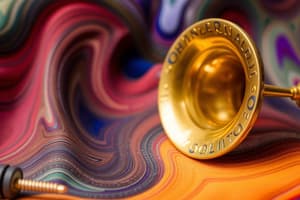Podcast
Questions and Answers
Which component of auditory arts refers to the highness or lowness of a sound?
Which component of auditory arts refers to the highness or lowness of a sound?
- Pitch (correct)
- Timbre
- Dynamics
- Rhythm
What does the term 'texture' in music primarily describe?
What does the term 'texture' in music primarily describe?
- The speed of the music
- The unique quality of a sound
- The loudness of the piece
- The interaction between different sounds or lines (correct)
Which element adds depth to a melody by combining different notes simultaneously?
Which element adds depth to a melody by combining different notes simultaneously?
- Harmony (correct)
- Form
- Rhythm
- Tempo
In auditory arts, which component is characterized by variations in loudness or intensity?
In auditory arts, which component is characterized by variations in loudness or intensity?
What aspect of auditory arts determines the organization or structure of a piece, such as verse-chorus form?
What aspect of auditory arts determines the organization or structure of a piece, such as verse-chorus form?
Flashcards are hidden until you start studying
Study Notes
Key Components of Auditory Arts
- Rhythm: Essential for establishing the flow of music, encompasses patterns of sounds and silences that create movement.
- Melody: Fundamental element consisting of a series of pitches organized to form a recognizable tune, driving the narrative in music.
- Harmony: Involves simultaneous notes forming chords, enhancing the emotional and aesthetic quality of the melody.
- Dynamics: Refers to changes in sound intensity, pivotal for conveying emotions and emphasizing specific sections within a piece.
- Timbre: Also known as tone color, it differentiates sounds from various instruments or voices, contributing to the piece's unique character.
- Pitch: Reflects sound frequency, impacting how listeners perceive different notes (high vs. low).
- Texture: Describes the interplay of sound layers, ranging from thick (multiple instrumentations) to thin (solos), affecting the overall sound complexity.
- Form: The structural blueprint of a musical work, determining its organization (e.g., verse-chorus, sonata), guiding the listener's experience.
- Tempo: Indicates the pace of a piece, influencing the emotional intensity and energetic feel of the music.
Summary of Interaction
- These elements interrelate to craft the rich, expressive qualities inherent in auditory arts, enabling artists to evoke various responses and emotions in their audience.
Studying That Suits You
Use AI to generate personalized quizzes and flashcards to suit your learning preferences.




